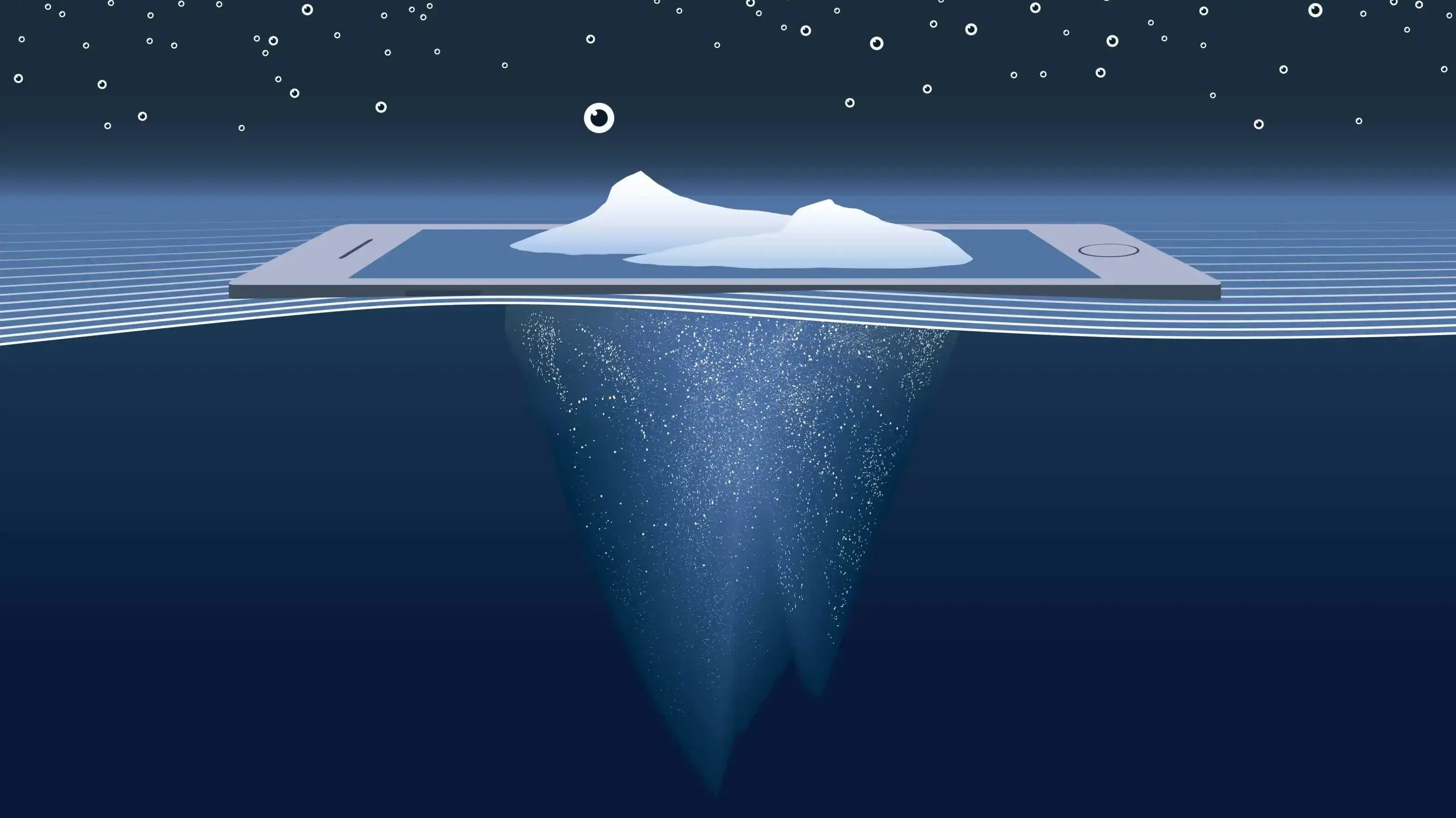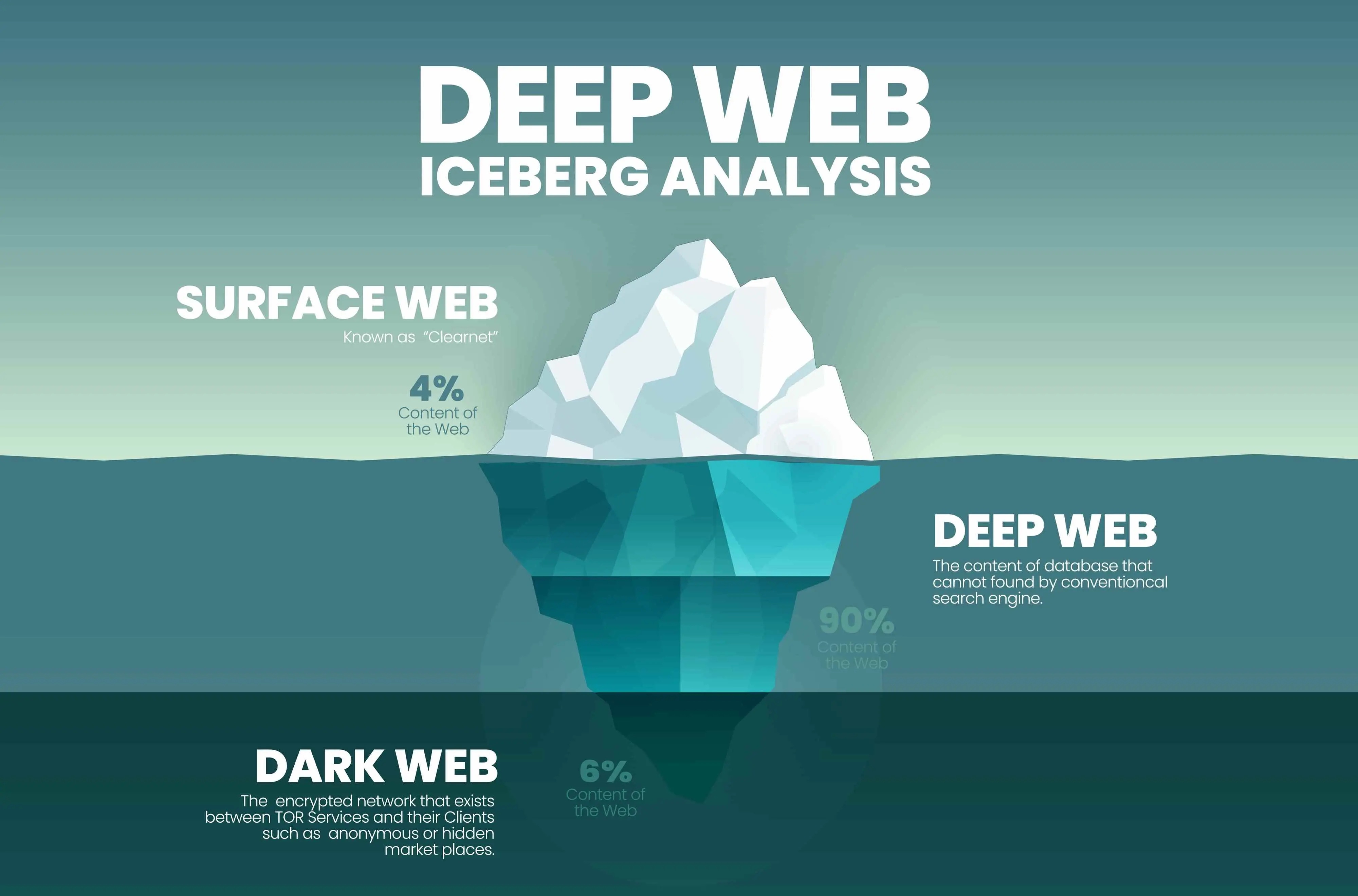The internet has transformed the world in unexpected and profound ways. Seemingly an omnipresent existence, its complexities and impact can sometimes be seen as difficult to fully comprehend. The internet's scale, with its enormous network of interconnected devices and vast, intricate web of information, can be mind-boggling. It continues to evolve with new protocols and technologies, and the sheer volume and diversity of information are overwhelming. Undoubtedly, the internet has become a platform for influence and power on a global scale; its vastness and decentralized architecture, meaning there is no central authority governing or controlling it, contribute to its enigmatic nature.
The internet remains a dynamic and complex entity; there's a lot of activity on the surface, yet it gets harder to see clearly what lies beneath, and this is where the Deep Web and Dark Web reside. The internet remains puzzling, and these two ideas, which are often used interchangeably but refer to different aspects of the internet, have been conflated in public discussions. If you have ever found yourself confused about the concepts of the Deep Web and the Dark Web, then this article will walk you through understanding the features of each concept. Let's dive in:
The Contrast Between the Dark Web and Deep Web
The indexed web comprises at least 7.42 billion pages as of Friday, May 19, 2023. This projected minimal size of the indexed world wide web is based on the number of pages indexed by the search engines Yahoo, Google, and Bing. But what do indexed web pages have to do with the dark or deep web?
A search engine functions similarly to a librarian, meticulously evaluating and categorizing web content submitted by site owners. These pages, like books in a library, become accessible to all after they are catalogued. When a user conducts a search, the search engine consults the index to identify websites that contain the keywords. Crawling, an automated procedure, is how indexing is done; in contrast, a page that a search engine cannot find is not indexed; consequently, a large portion of the web is not indexed. This part is referred to as the "deep web”. The structure of the internet is the surface web and the deep web, and beneath the deep web lies the dark web.
The Deep Web is a sensitive and private part of the internet where owners of web pages’ gate-keep their content behind paywalls, password-protected websites, or use other methods to prevent them from being found. While the Dark web is a small subset of the deep web that is purposely hidden, constituting a minuscule part of the whole Internet.
Reasons for the Existence and Anonymity of These Hidden Parts of the Internet
While the surface web, which is estimated to only be about 4% of what's available on the internet, is entirely public and would turn up easily on search engines like Bing, Yahoo, and Chrome, there are also reasons why an estimated 90% of the internet remains hidden. The deep web exists on the basis of privacy and anonymity and is an attraction for people who simply want their information and activities secure and free from unauthorized access or intrusion. The vast amount of personal data that is collected, stored, and analyzed by various organizations and online platforms has increased over time, which is why the deep web exists because it provides owners with control over their personal data and the freedom to make choices about how their information is collected, used, and shared.
Common Misconceptions and Popular Media Portrayals
Fictional portrayals of the deep web and the dark web have led to certain common misconceptions that have taken away their complexity and nuance. Movies like Snow Crash and Silk Road are among a plethora of movies that sensationalize the dark web and some of the common misconceptions are;
1. There's no difference between the deep and dark web: In reality, these are two distinct parts of the internet where the deep web encompasses all unindexed parts of the internet, and the dark web requires a special search engine [Tor] to be able to access it.
2. The dark web is untraceable: In actuality, law enforcement agencies are consistently improving their ability to track criminals on the dark web.
3. The deep web is filled with illegal activities: This is an error as the dark web is actually the part of the web where this happens however, it is also good to note that the dark web can also have legitimate uses such as political activism and whistle-blowing.
4. The dark web is easy to access: Contrarily, it requires a special browser and it can be difficult to navigate through the right website.
Understanding the Deep Web and Navigating the Dark Web
According to statistics, the deep web, which is the fastest-growing category on the internet, is estimated to be 500 times larger than the surface web and makes up around 90% of all web pages. The uses are divided into legitimate uses, which include healthcare records and educational materials, and illegal uses [dark web users], which include human trafficking, drug trafficking, and so on.
The contents of the deep web are decentralized and fragmented, and there is a vast amount of information on the deep web that is not accessible to the general public, so how can you find this information? This is where indexing and search engines come into play, as they facilitate access to deep web content. It would be great to note that legal and ethical standards need to be exercised while exploring this part of the internet. While traditional search engines cannot work towards accessing valuable information on the deep web, there are search engines explicitly designed to assist in discovering hidden content. Like the surface web, the dark web is indexed, but not by regular search engines. All sites on the dark web end with ".onion," as opposed to ".com" or ".org" on the surface web, which is a deliberate attempt to limit access to those sites to browsers utilizing designated proxies like SearX and Tor. Criminals, informants, and political dissidents, for example, are welcome on the dark web because they can benefit from the anonymity it provides. However, anyone who routinely uses the internet can gain access to the dark web, which is mostly legal to use.
Characteristics of the Deep Web

The "deep web" is a region of the World Wide Web that is not indexed by search engines. Information cannot be easily found using regular search engines because it requires certain access, processes or credentials.
A substantial number of dynamically formed, hidden websites that are created in response to user input or requests may be found on the Deep Web. These areas contain substantial databases, archives, and repositories.
The deep web is not browser-specific and does not provide users with anonymity because it requires a valid username and password to access it.
While the Deep Web does contain some illegal material, such as portions of the Dark Web, its main focus is on legitimate and legal content. This can include scientific databases, government information, academic research, health records and other priceless sources.
According to estimates, the surface web—the part of the internet that is reachable through search engines—is considerably smaller than the deep web. Although the exact size is unknown, it is thought to contain many terabytes or petabytes of data.
The deep web does not offer users anonymity, and since it is accessible through a legitimate username and password, it is not browser-specific. Databases may contain valuable resources, including legal documents, medical records, government documents, scientific studies, and more. For instance, to access their banking details, individuals must first log in to banking websites. There is no way to look for this.
Characteristics of the Dark Web
The dark web, as previously said, is the area of the internet that has been purposefully concealed and rendered unavailable to general users. It is an ever-changing landscape and it is important to pay attention to certain characteristics that are unique to this area of the deep web.
The content on the dark web can only be accessed with specialized software or setups and is only accessible on peer-to-peer networks or privately encrypted networks, as opposed to standard web pages that are indexed by search engines like Mozilla.
The Deep Web's infrastructure is what the Dark Web depends on; hence, its size and scope cannot be accurately quantified.
The Dark Web, one of the greatest networks in the world for online crime and terrorism, is well recognized for being uncontrolled and anarchical and is primarily utilized for illegal activities.
Communication on the dark web is anonymous, and users employ different techniques using encryption, and VPNs to maintain their privacy.
Accessing the Dark Web through Tor and Other Privacy Tools
"The Onion Router," also known as “Tor”, is a key component of the hidden web. This free, open-source software uses a network of volunteer-operated stations to route and encrypt internet data through numerous relays, operating like a secure postal service. This guarantees anonymous communication by protecting the data during the transmission process, making it possible for users of this browser to get around censorship and access the dark web. While it is used for illegal or criminal activity, the browser is also well-liked by journalists, those seeking anonymity, and individuals who are political or corporate whistleblowers.
Dark Web Security and Risks
There are security risks connected to the dark web as a result of its lack of regulation. Because it serves as a marketplace for illicit trade, the dark web is replete with scams, and the common security risks of using the dark web are identity theft, phishing, and malware. While there is some anonymity in this space, it is important to understand that accessing this part of the internet may be prohibited in some countries. Additionally, law enforcement agencies actively monitor activity on this part of the internet, and engaging in illegal activity may draw their attention. Therefore, if you must use this portion of the world wide web, then it is important to protect your personal information by:
Using strong passwords and two-factor authentication, which adds a layer of security.
Make sure not to share important personal information online, including address and phone number, among other private information.
Using a VPN which enables you to encrypt your traffic causing it to be more difficult to track activities online.
Avoiding websites on this portion of the internet that request that you share personal information.
There's no foolproof way of maintaining anonymity and also protecting your information online. You must be aware of the risk and be careful about the websites you visit.
Beyond Illicit Activities
Even though the dark web may not be the abomination that some have claimed it to be, the rest of the Internet is at risk because of its very presence. The discussions surrounding ethical issues while discussing privacy and surveillance on the dark web are enveloped by a variety of diverse viewpoints. Although surveillance has the potential to violate someone's right to privacy, it can also be used to reduce possible threats. Beyond the illegal behaviors that need surveillance, privacy is necessary for situations where anonymity is crucial. The dark web serves as a space where activism against ruthless regimes and corporate or political whistleblowing thrive. It is not just for criminals.
Future Trends and Evolving Landscape
The Deep Web and Dark Web have been affected by technological developments, which have also aided in the development of decentralized marketplaces that may handle activities like the cryptocurrency market. These advancements have made it possible to support anonymous payments, more secure pseudonymous transactions, and improved encryption mechanisms. But just as the development has made it possible for a broader market, it has also given cybercriminals a level of sophistication in their operations.
Summary
In conclusion, the Deep Web and the Dark Web are separate parts of the World Wide Web with distinctive traits. Even though the Dark Web is linked to illegal activity and has negative effects, it only makes up a small percentage of the Deep Web. However, the Deep Web as a whole comprises a huge landscape, and email providers like Gmail are a part of the Deep Web because a majority of their data is inaccessible to search engines. This illustrates the size and importance of the Deep Web, which even widely used platforms employ to function outside the scope of conventional search engines.
Frequently Asked Questions
What security is proved by the data host?
Your host will provide firewalls, antivirus and encryption as standard.
How does Verpex ensure the security of my CRM data?
Verpex employs multiple layers of security measures to protect your CRM data. This includes using advanced firewalls, secure data centers, regular security updates, and SSL encryption for data transmission. Additionally, we conduct frequent backups to ensure data recovery in case of any security incidents.
Why choose Verpex for WordPress?
As the leading CMS out there, we’ve made it our mission to offer the most comprehensive and streamlined WordPress solutions on the market. Backed by a responsive customer care team and reliable site enhancement tools, we ensure our users get the full WordPress value and support for a reasonable price.
Can I buy and sell a domain from Verpex?
No, you can not buy and resell a domain from Verpex

Jessica Agorye is a developer based in Lagos, Nigeria. A witty creative with a love for life, she is dedicated to sharing insights and inspiring others through her writing. With over 5 years of writing experience, she believes that content is king.
View all posts by Jessica Agorye





















